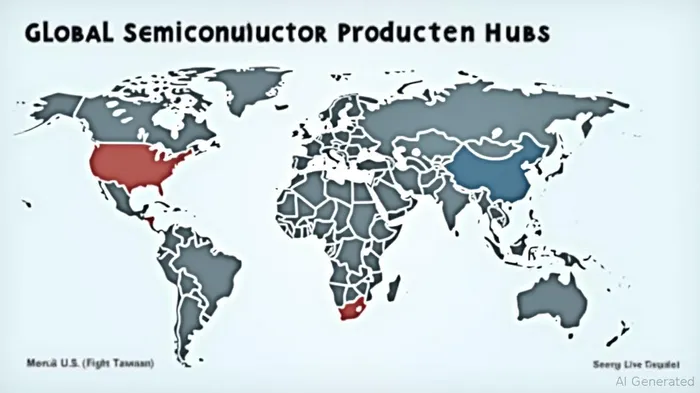U.S.-China Trade Dynamics: Navigating Tariffs and Geopolitics with Resilient Sectors
The recent upgrade of Boeing's credit outlook by Fitch Ratings to "stable" from "negative" underscores a critical truth: even amid escalating U.S.-China trade tensions, companies with robust operational discipline, diversified supply chains, and government-backed support can thrive. Boeing's turnaround—driven by debt reduction, production ramp-ups, and strategic asset sales—serves as a microcosm of broader industry stabilization efforts. For investors, this signals an opportunity to identify sectors where firms are proactively mitigating geopolitical risks. Let's explore three key areas—semiconductors, renewable energy, and AI—where resilience is being built through innovation, diversification, and policy alignment.
Semiconductors: The Heart of Global Tech, and Its Defense Against Disruption

The semiconductor industry is a battleground in the U.S.-China trade war, but it's also a beacon of resilience. Companies like TSMC, Intel, and Samsung are investing heavily in advanced manufacturing nodes (3nm and 2nm) and chiplet technology to maintain global competitiveness. Their strategies include:
- Supply Chain Diversification: Expanding fabrication capacity in regions like the U.S., EU, and Taiwan to reduce reliance on China. The EU's $43 billion Chips Act and the U.S. CHIPS Act are accelerating this shift.
- R&D Dominance: TSMC's lead in 3nm technology and Intel's $100+ billion investment in U.S. fabs ensure they stay ahead of competitors.
- Government Partnerships: TSMC's $12 billion Austin, Texas, plant and Samsung's $17 billion Texas facility exemplify how public-private collaboration drives stability.
Investment Takeaway: TSMC and Intel are leaders in capitalizing on geopolitical shifts. Look for opportunities in semiconductor ETFs like the VanEck Vectors Semiconductor ETF (SMH), which tracks companies at the forefront of chip innovation.
Renewable Energy: Green Growth Amid Trade Barriers
The renewable energy sector is another arena where companies are leveraging government support and supply chain flexibility. Key trends include:
- Solar and Wind Dominance: Firms like Vestas (wind turbines) and First Solar (solar panels) benefit from U.S. Inflation Reduction Act (IRA) incentives, which subsidize domestic manufacturing.
- Critical Minerals Security: The U.S. is accelerating mining of lithium, cobalt, and rare earths through partnerships like the Critical Minerals Alliance, reducing reliance on China.
- Global Diversification: Companies are expanding production in Mexico (under USMCA) and Southeast Asia to avoid tariffs. NextEra Energy (NEE), the world's largest renewable energy producer, exemplifies this strategy.
Investment Takeaway: Sector ETFs like Invesco Solar ETF (TAN) or iShares Global Clean Energy ETF (ICLN) offer diversified exposure to companies benefiting from green policies and supply chain resilience.
AI and Chips: Navigating Export Controls with Innovation
The AI sector faces unique challenges due to U.S. export controls on advanced chips, but firms are adapting through creative solutions:
- NVIDIA ($30B in 2024 AI chip exports) is pivoting to Middle Eastern partnerships (e.g., Saudi Arabia's $600B investment deal) and developing restricted-capability chips (e.g., H20/G80) to comply with export rules.
- AMD and Intel are designing hybrid chips that balance performance with regulatory compliance, while Qualcomm is expanding production in Vietnam and Thailand.
- Government Alignment: The U.S. “universal authorization” framework for Tier 1 allies (EU, Japan) ensures smoother exports, reducing risks for compliant companies.
Investment Takeaway: NVIDIA and AMD remain top picks for their R&D strength and diversified strategies. Investors should also consider AI hardware ETFs like the Global X AI Development ETF (AIC) for broader exposure.
The Bottom Line: Betting on Resilience
The BoeingBA-- example shows that companies can stabilize—and even thrive—by addressing supply chain fragility, reducing debt, and aligning with policy tailwinds. Investors should prioritize firms with three key traits:
1. Strong R&D pipelines (e.g., semiconductor and AI leaders).
2. Geographically diversified supply chains (avoiding overexposure to China).
3. Government-backed support (leveraging subsidies and trade agreements).
While trade tensions will persist, sectors like semiconductors, renewables, and AI are proving their resilience. As Fitch's Boeing upgrade suggests, the companies that anticipate and adapt to geopolitical risks will emerge as winners in the years ahead.

Tracking the pulse of global finance, one headline at a time.
Latest Articles
Stay ahead of the market.
Get curated U.S. market news, insights and key dates delivered to your inbox.

Comments
No comments yet